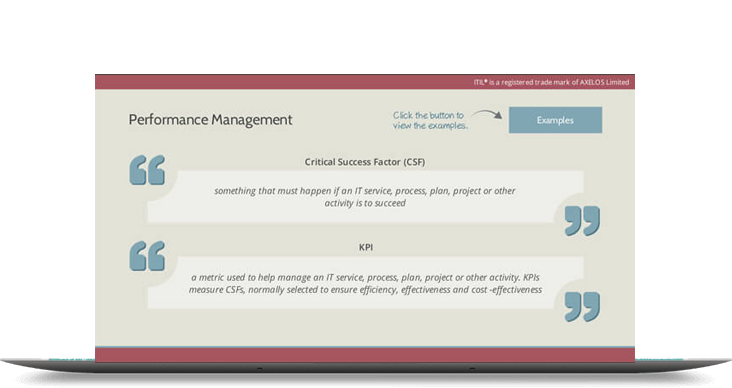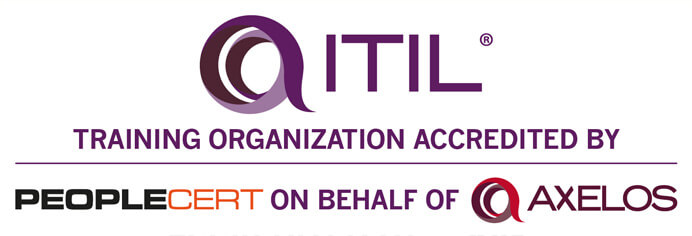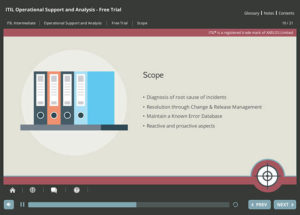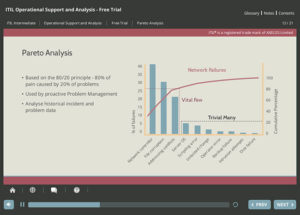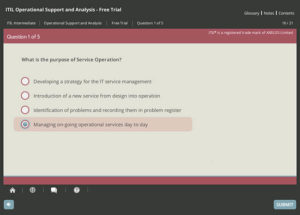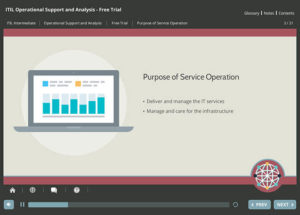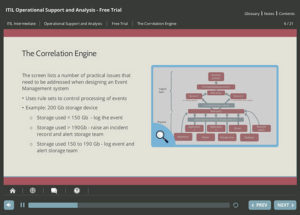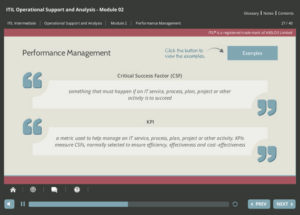E-learning ITIL® Operational Support & Analysis (OSA)
Study for a qualification in ITIL Operational Support & Analysis (OSA) by taking an online training course from 4PA e-Learning!
Our course has been accredited by PeopleCert, who are licensed by AXELOS as an Examination Institute for an ITIL Operational Support & Analysis qualification in IT Service Management.
Why you Should Take This Course:
The course is designed to help you to prepare to take and pass the exam leading to the ITIL Intermediate Certificate in Operational Support and Analysis. Success in the exam will also earn you 4 credits towards the 22 credits needed to gain the ITIL Expert qualification.
It helps you gain competence in the aspects of service management that relate to OSA, including…
- The value of OSA activities for the business
- How OSA supports and interacts with other service lifecycle activities
- A detailed understanding of the OSA processes: incident management, request fulfilment, event management, problem management, and access management
- How OSA can deliver operational excellence
- Organizing for service operation
Browse the course syllabus for a full module by module breakdown of what’s included.
With this course, you’ll receive 6 months access from the date of purchase as well as a FREE exam voucher to use whenever you are ready to sit the exam!
ITIL Operational Support and Analysis (OSA) focuses on the practical application of OSA practices in order to enable event, incident, problem, access, technical, IT Operations and application management, request fulfillment and Service Desk operations.
This course will provide you with a good understanding of the Operational Support and Analysis principles, its processes and other aspects within the capability stream.
Why Study ITIL OSA with 4PA?
4PA is :
- A Leading Training & Consulting Organization
- Accredited by various principals
- World-wide presence and delivery models
- Unique, but proven,knowledge transfer and validation techniques
- Adds great value to the Organizations
- Result oriented approach
By taking this course, participants will benefit from learning the following:
Event Management – Ensuring CIs and services are constantly monitored and aims to filter and categorize Events in order to decide on appropriate actions if required
Incident Management – Ensuring management of the life-cycle of all Incidents and return IT services to users as quickly as possible
Access Management – Ensuring authorized users are granted the right to use a service, while preventing access to non-authorized users
Problem Management – Ensuring management of the life-cycle of all Problems, preventing Incidents from happening, and to minimize the impact of incidents that cannot be prevented
Technical Management – Providing technical expertise and support for the management of the IT infrastructure
Request Fulfillment – Fulfilling Service Requests or requests for information
IT Operations Management – Ensuring management of IT services and their underlying infrastructure, executing day-to-day routine tasks related to the operation of infrastructure components and applications
Application Management – Ensuring management of applications throughout their life-cycle including design, test, operation and improvement of IT services, as well as developing the skills required to operate the IT organization’s applications
Service Desk – Ensuring receipt and processing of Service Requests, assisting users, and for coordinating Incident Resolution with Specialist Support Groups
The Benefits of eLearning:
All 4PA e-Learning courses run entirely over the web and have been carefully designed to provide the most comprehensive, interactive and flexible learning experience available. Study when it suits you – at home, at work or on the move.
Flexibility to learn from your desktop, laptop or tablet at your own pace, when it suits YOU. Anytime. Anywhere (an internet connection is required).
Our courses are easy-to-use. Participants will benefit from an interactive multimedia environment that enhances the way you study.
With eLearning, individuals and organizations avoid the typical costs of travel and consultancy by studying independently online.
Our online training courses are designed with mobility and accessibility in mind. You can access your training from any desktop computer, laptop, tablet, or mobile phone.
This eLearning course contains all the learning materials you need in order to prepare for the ITIL OSA exam.
Our course has been accredited by PeopleCert, who are licensed by AXELOS as an Examination Institute for the ITIL® Operational Support & Analysis Certificate in IT Service Management.
The official mock exams are provided and the course includes a module on how to approach these, working through some examples.
In addition to the resources provided, the examination guidance recommends that candidates should complete at least 30 hours and30 minutes of personal study.
Full Details of our ITIL OSA Course:
Each of the syllabus areas will be covered in a module of the course; each module may contain a number of lessons, dependent on the areas covered.
Browse the contents of this eLearning course by clicking on a module title below that you would like to know more about. Why not try a free trial module of our course before you buy!
Module 1: Introduction to Operational Support and Analysis
This module provides an introduction to the core concepts and terminology of the service life-cycle, and the role that OSA activities play within the life-cycle.
The candidate must be able to understand and describe:
The value to the business of OSA activities
The scope of OSA processes and functions
The lifecycle within the OSA context
How OSA activities support the service lifecycle
Optimizing service operation performanceModule 2: Event Management
This module covers how the process of event management contributes to OSA practices.
A complete overview of the objectives, scope and importance of event management as a process to generate business value are explored. Event management policies, principles, concepts, design, activities, methods and techniques are explained in relationship to OSA practices as well as to information management.
The candidate must be able to understand and describe:
The purpose and objectives of the event management process
The scope of the event management process
The value to business and to the service lifecycle
The policies, principles and basic concepts of event management
Designing for event management
Use of event rule sets and correlation engines
The process activities, methods and techniques that enable this process and how it relates to the service lifecycle
The triggers, inputs and outputs, and interfaces
Information management within the event management process
How critical success factors and key performance indicators can be used to check effectiveness and efficiency of the event management process
The challenges and risks associated with the event management processModule 3: Incident Management
This module covers how the process of incident management contributes to OSA practices.
A complete overview of the objectives, scope and importance of incident management as a process to generate business value are explored. Incident management policies, principles, concepts, activities, methods and techniques are explained in relationship to OSA practices.
To meet the learning outcomes and examination level of difficulty, the candidates must be able to understand, describe, identify, demonstrate, apply, distinguish, produce, decide or analyze:
Th
e purpose and objectives of the incident management process
The scope of the incident management process
The value to business and to the service lifecycle
The policies, principles and all basic concepts of incident management
The process activities, methods and techniques and how they relate to the service lifecycle
The triggers, inputs and outputs and interfaces
Information management within the incident management process
How critical success factors and key performance indicators can be used to check the effectiveness and efficiency of the incident management process
The challenges and risks associated with the incident management processModule 4: Request Fulfillment
This module covers the request fulfillment process and how it contributes to OSA.
A complete overview of the objectives, scope and importance of request fulfillment as a process to generate business value are explored.
Request fulfillment policies, principles, concepts, activities, methods, request models and techniques are explained in relationship to OSA practices as well as to information management.
The candidate must be able to understand and describe:
The purpose and objectives of the request fulfillment process
The scope of the request fulfillment process
The value to business and to the service lifecycle
The policies and principles of request fulfillment and the request model concept
The process activities, methods and techniques and how they relate to the service lifecycle
The triggers, inputs and outputs and interfaces
Information management within the request fulfillment process
How critical success factors and key performance indicators can be used to check effectiveness and efficiency of the request fulfillment process
The challenges and risks associated with the request fulfillment processModule 5: Problem Management
This module covers how the problem management process contributes to OSA practices.
A complete overview of the objectives, scope and importance of problem management as a process to generate business value are explored.
Problem management policies, principles, concepts, activities, methods, problem models and techniques are explained in relationship to OSA practices as well as to information management.
The candidate must be able to understand and describe:
The purpose and objectives of the problem management process
The scope of the problem management process
The value to business and service lifecycle
The policies and principles of problem management and the problem model concept
The process activities, methods and techniques and how they relate to the service lifecycle
The triggers, inputs and outputs, and interfaces
Information management within the problem management process
How critical success factors and key performance indicators can be used to check effectiveness and efficiency of the problem management process
The challenges and risks associated with the problem management processModule 6: Access Management
This module covers how the access management process contributes to OSA practices.
A complete overview of the objectives, scope and importance of access management as a process to generate business value are explored. Access management policies, principles, concepts, activities, methods, access models and techniques are explained in relationship to OSA practices as well as to information management.
The candidate must be able to understand and describe:
The purpose and objectives of the access management process
The scope of the access management process
The value to business and service lifecycle
The policies and principles of access management
The process activities, methods and techniques and how they relate to the service lifecycle
The triggers, inputs and outputs, and interfaces
Information management within the access management process
How critical success factors and key performance indicators can be used to check effectiveness and efficiency of the access management process
The challenges and risks associated with the access management processModule 7: The Service Desk
This module covers the service desk function and how it contributes to OSA.
A complete overview of the objectives, scope and importance of the service desk as a function to generate business value are explored. Service desk policies, principles, concepts, activities, methods and techniques are explained in relationship to OSA.
Also covered is the service desk role, organizational structures, staffing options and outsourcing strategies.
The candidate must be able to understand and describe:
The service desk role
The service desk objectives
Different service desk organizational structures
Different service desk staffing options
Measuring service desk performance
Issues and safeguards to consider when outsourcing the service desk
Performance management
Issues for outsourcingModule 8: Common OSA Functions and Roles
This module deals with how the service operation functions of technical management, IT operations management, and applications management contribute to OSA practices.
For each function, the roles are defined along with the objectives, scope, importance, policies, principles, concepts, activities, methods and techniques in relationship to OSA.
The candidate must be able to understand and describe:
The roles of each function
Their objectives
The objectives and activities of the OSA functionsModule 9: Technology and Implementation Considerations
This module covers technology implementation as part of implementing service management process capabilities. It also covers the special technology functions and features that are related to OSA practices.
The candidate must be able to understand and describe:
The generic requirements for technology to support process capability
The evaluation criteria for technology and tools for process implementation
Project, risk and staffing practices for process implementation
The challenges, risks and CSFs related to implementing practices and processes
How to plan and implement service management technologies
Evaluating tools, planning and implementing technologiesModule 10: Exam Preparation
- This module prepares you for the ITIL Operation Support and Analysis examination.
Thinking of sitting the ITIL Operational Support & Analysis Exam? On this page, you will find everything you need to know!
In order to achieve this ITIL Intermediate qualification, you must pass the ITIL® Operational Support & Analysis Certificate in IT Service Management exam.
You can take the exam online (virtually) using a service provided by PeopleCert.
What you Need to Know About the Exam:
The examination will consist of a complex multiple choice, scenario-based closed book paper of 8 questions, to be answered within 90 minutes.
To pass the exam you must get 28 out of 40 questions correct, or 70% and if successful, delegates will gain 4 credits towards ITIL Expert level.
The course materials provided in the Operational Support & Analysis eLearning course will provide you with all the information you need for this exam.
Exam Duration: Maximum 90 minutes for all candidates in their respective language (Candidates sitting the examination in a language other than their first language have a maximum of 120 minutes and are allowed to use a dictionary).
Before you book you can test that your computer configuration will meet the requirements for a PeopleCert exam, using this online test.
This test focuses on the suitability of your webcam, microphone and internet connection. Please Visit the PeopleCertwebsite for a complete list of information and guidance.
You will be Tested on:
Introduction to Operational Support and Analysis
Event Management
Incident Management
Request Fulfillment
Problem Management
Access Management
The Service Desk
Common OSA Functions and Roles
Technology and Implementation Considerations
Exam Preparation
Why not try out a free trial module from our ITIL Operational Support & Analysis eLearning course!
In this ITIL Intermediate trial module, you will gain an understanding of how to apply OSA practices in resolution and support of the service management life-cycle.
Try the Course Before you Buy!
Like the full ITIL Operational Support & Analysis (OSA) eLearning course, you can access this free trial module from any device whether you are at home, at work, or on the move!
Our course has been fully accredited by PeopleCert, who are licensed by AXELOS as an Examination Institute for IT Service Management.
If you require any other information regarding the course or how to access the e-learning on a mobile device, please feel free to leave your details with us via our online contact form and a member of our team will be in touch.
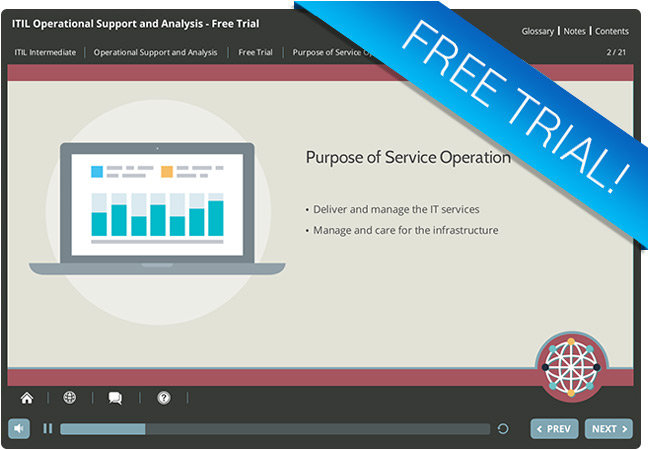
ITIL® and the The Swirl Logo™ are registered trade marks of AXELOS Ltd. Used and reporodued with the permission of AXELOS.


